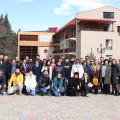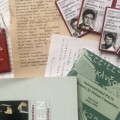To what extent do you consider the First Artsakh War to be sufficiently reflected in Armenian literature?
I think that the Artsakh War is not sufficiently presented in Armenian literature and it is for that very reason that the young generation does not know about this war. The educational system and official historiography have their share of the blame, naturally, as does the pathos-heavy propaganda offered or encouraged by the state, which focused only on the heroic side, underestimated the adversary and mocked them, shaping a society here that was completely cut off from reality, completely unprepared, baselessly overconfident and maximalist.
Your generation bore witness to a war, victory, then another war, and defeat. How will all this be reflected in our literature, in your opinion, so that they can present the complete picture of these times in which we are living?
What myths did this recent Artsakh War destroy for you as a writer?
What thoughts were born as a result of the Second Artsakh War and the defeat we suffered?
How can the war be reflected in our literature?
The four questions listed above are closely linked to each other and, as a writer, my answer to these questions can only be through literature. It is not possible to talk about them briefly and clearly, especially considering that we still have to give meaning to so many things and the shock is still quite fresh. Personally, no myths were shattered at my end, but I was the one that ended up broken. This isn’t so much about myths, because the thought that one can live without myths is also a myth in itself. Old myths will constantly be replaced by new ones, and these will often be drier, more cynical and briefer in duration. Is it a myth that human beings are good by default? We know that humans are neither good nor evil. We know that human beings are more than just their physiology. Are we believing in a myth when we want to tell ourselves that human beings are more good than evil, that they are more than just their basic instincts? We need this in order to have a healthy outlook and a sense of general hope. I don’t think what happened was a belief in myths – it was an attempt to believe in human beings that failed. But this was not just another failure, and one cannot just blame me or the other people like me that believed. This seemingly personal failure is going to have a major impact on a societal level, because after we wake up from this community-level self-deceit, after we acknowledge our own share of the blame, there should be all kinds of changes, and not all of them will be positive. I read recently that a young person in Turkey, who had been proud all his life of his Turkish heritage, happened to find out that he was actually an Armenian; he ended up committing suicide. Everything is much more complicated and I cannot share some people’s one-sided excitement that this kind of awakening will have a positive impact. All kinds of things can happen, there is a range of factors to consider. And the question of whether it is positive or negative is still a question – it depends on who you ask. What is positive and what is negative when it comes to the perspectives for our society? This is a very big question.
For many years, we have seen that Armenian and Azerbaijani or Armenian and Turk intellectuals and civil society actors have met and participated in various seminars both in Yerevan and Baku as well as in several corners of the world, with considerable grants spent on these events. Why was all of this unable to serve its purpose, globally speaking, of establishing peace and reconciliation, and why did the Second Artsakh War take place?
Because it is an extremely superficial myth that one can achieve peace through all the means mentioned above.
The three former presidents of Armenia attempted to launch relations with Turkey. Why did Turkey not adopt a neutral stance during the Second Artsakh War?
Because Turkey has never been neutral and, in all cases when Turkey maintained neutrality (like the First Artsakh War), this was mainly dictated by the geopolitical situation of the time, and their own perception of their role, by their lack of preparedness, as well as the European ambitions of the intellectual, but very small, section of society, which do not reflect the desires that exist in the depths of the population there.
So how can we establish good neighborly relations with Azerbaijan if they don’t return our compatriots that they hold prisoner?
We cannot.
Can a writer’s words and text play a role in peacebuilding initiatives and succeed? Will these words be understood and accepted?
No, this is impossible. It is a hopeless task.
As a writer and an intellectual, how do you see your own mission when it comes to fostering reconciliation between these peoples and the establishment of good relations with neighbors?
I don’t know, I can’t see it.



